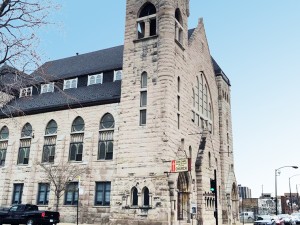This month, the African Methodist Episcopal Church celebrates its 200th anniversary. The church has a long history of social activism and spiritual edification. Many AME churches served as stations on the Underground Railroad, helping to usher fugitive slaves to freedom in places like Michigan or Canada. One such station was Chicago’s own Quinn Chapel AME Church.
In the late 18th century, African American Methodists witnessed a growing lack of support for the anti-slavery movement among their white counterparts. This, coupled with increasingly segregated and discriminatory church services and practices, led to the formation of separate African American Methodist congregations.
In 1787 Philadelphia, alienated black members of St. George’s Methodist Episcopal Church exited the church to organize the Free African Society, a beneficial and mutual aid society. In 1794, they converted a blacksmith shop into Bethel Church.
Bethel later united with three other Northeastern churches to form the first wholly black independent denomination in the United States, the African Methodist Episcopal Church. In April 1816, Richard Allen, a former slave who bought his freedom in 1780, was elected the first bishop of the African Methodist Episcopal Church.
Chicago's Quinn Chapel began as a prayer group in 1844 and by 1847 grew to become a congregation recognized by the AME.
Quinn Chapel was not only a stop on the Underground Railroad but also became a speaking platform for activists looking to reach the city’s African American population. Frederick Douglass, Susan B. Anthony, W.E.B. Du Bois, Dr. Martin Luther King Jr., and President Barack Obama are just a few of the figures who spread their message from the church’s pulpit.
In 1979, Quinn Chapel, at 24th Street and Wabash Avenue, was added to the National Register of Historic Places. CPL’s Vivian G. Harsh Research Collection holds the Quinn Chapel AME Archives if you’re interested in learning more about this grand Chicago institution.





Add a comment to: AME Church Celebrates 200 Years of Spiritual and Social Salvation